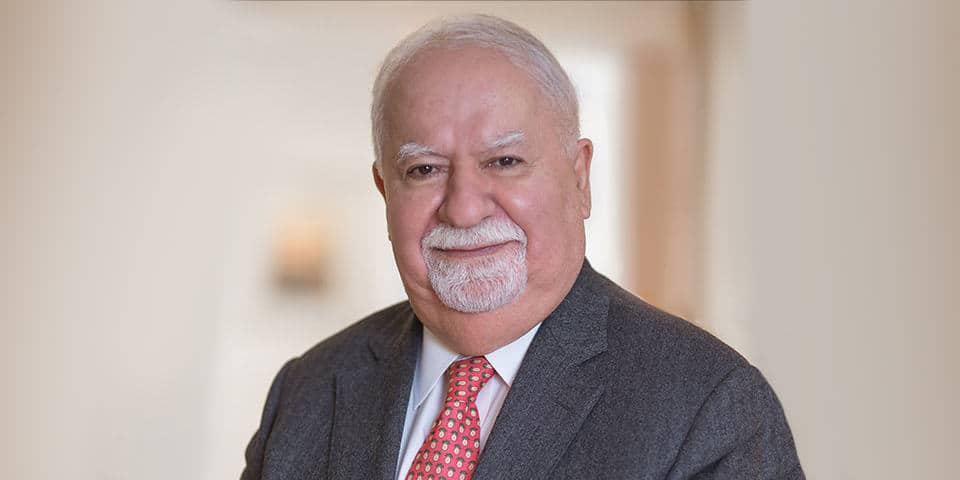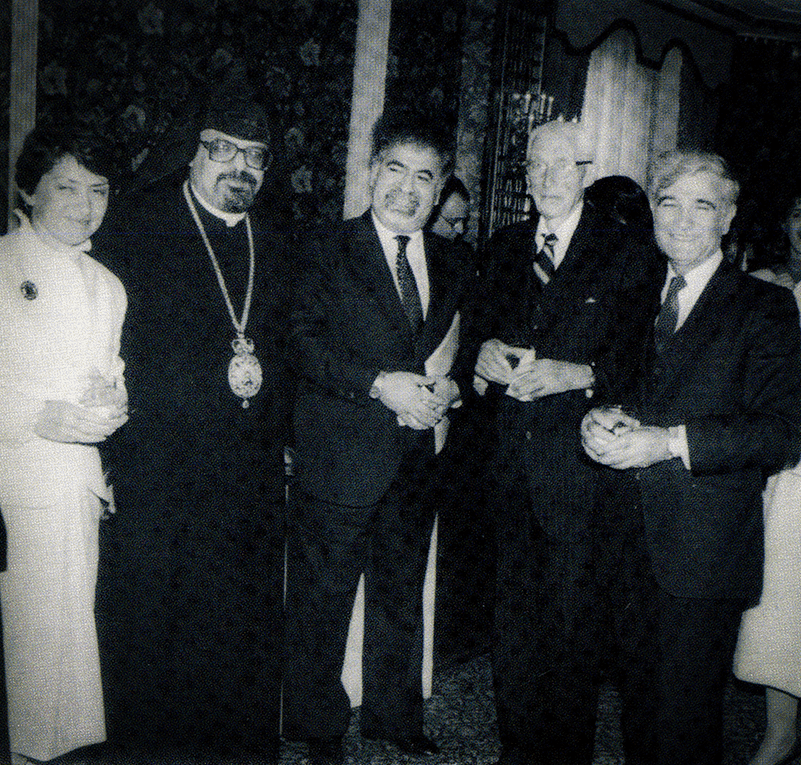DR. VARTAN GREGORIAN (April 8, 1934 – April 15, 2021)


Dr. Vartan Gregorian was the keynote speaker at the celebration of the 50th anniversary of the Seminary of the Catholicosate of the Great House of Cilicia, in 1981. From left to right: Mrs. Emma Doumanian; Archbishop Mesrob Ashjian, Prelate; Dr. Gregorian; Cleveland E. Dodge, son of Cleveland H. Dodge, cofounder of the Near East Relief; Mr. Ara Doumanian.
Archbishop Anoushavan and the Religious and Lay Councils mourn the passing of historian, academic, and philanthropist Vartan Gregorian, a remarkable public intellectual in the United States, a well-known figure in the Armenian world, and a good friend to the Prelacy for many decades.
Born in Tabriz, Iran, in 1934, he received his primary education in his birthplace and his secondary education at the Nshan Palandjian Jemaran (Collège Arménien) in Beirut, Lebanon, where he enjoyed the mentorship of its principal, Simon Vratzian. He moved to the United States in 1956 and graduated from Stanford University in 1958, where he was awarded a Ph.D. in history and humanities in 1964 with a dissertation entitled “Traditionalism and Modernism in Islam.” He taught European intellectual history and Middle Eastern history at San Francisco State College (1962-1968), the University of California at Los Angeles (1968), and the University of Texas at Austin (1968-1972). In 1969, he published the monograph “The Emergence of Modern Afghanistan: Politics of Reform and Modernization, 1880-1946.” In 1972, he took the position of professor of Armenian and Caucasian history, and South Asian history at the University of Pennsylvania. He was founding dean of the Faculty Arts and Sciences (1974-1978) and provost (1979-1980).
After being considered a candidate for President of the University of Pennsylvania, Dr. Gregorian was tapped to serve as President of the New York Public Library from 1981 to 1989. He was credited with restoring the status of the library to its former splendor. “His leadership and tenacity revitalized and reaffirmed the Library as the preeminent civic and educational institution that New Yorkers know and love today,” wrote the NYPL in an obituary, while The New York Times called him “savior of the New York Public Library” in its own obituary. He also taught history and Near Eastern studies at New York University and The New School for Social Research. His success led to his appointment as President of Brown University in 1989, where his tenure was also marked by an outstanding legacy. Besides professorships in both the University of Pennsylvania and Brown University, an elementary school in Providence, Rhode Island, was renamed after Gregorian to acknowledge his role in strengthening relationships between the university and the community at large. “We must continue to provide opportunities for all so that our country’s best institutions of higher learning do not become the sole preserve of the talented few who are wealthy enough to afford tuition or poor enough to qualify for aid,” he said in his final Convocation address at Brown in 1997.
Also in 1997, Mr. Gregorian assumed the presidency of the Carnegie Corporation of New York, one of the country’s oldest grant making foundations, which he held until his death. He chronicled his “rags-to-riches” story in his memoirs, “The Road to Home” (2003). His philanthropic work and scholarly accomplishments were recognized with dozens of honorary degrees, awards, as well as appointments of the highest order by Presidents George H. W. Bush, William J. Clinton, George W. Bush, and Barack Obama, including the National Humanities Medal and the Presidential Medal of Freedom. He was decorated by the Armenian, Austrian, Italian, Portuguese, and French, governments, and he was a member of the National Academy of Sciences of Armenia. He was a co-founder of the Aurora Humanitarian Initiative with Ruben Vardanyan and Dr. Noubar Afeyan, who established a scholarship program named after Vartan Gregorian to support scholarly research of Armenian history. In 2018, the new building of the National Association for Armenian Studies and Research (NAASR) in Belmont, Massachusetts, was also named after him.
Vartan Gregorian always stayed in touch with the Armenian community wherever he was and his message was always to be bold and daring. As part of his overarching commitment and encouragement of education, he helped the Armenian Sisters Academy of Philadelphia early on and always encouraged the committees to think big and out of the box. He thought to think of large goals and not to minimize the goals but to maximize fund raising goals and to take bold actions with the community. He was often accessible to committee meetings and always helpful for Fund raising and PR practices. His presence at the Prelacy was always uplifting and successful for future projects. He was a helpful voice in giving advice and guidance, and his speeches in various events were a source of inspiration. In October 1997, during the first pontifical visit of Catholicos Aram I to the Eastern Prelacy, His Holiness bestowed the Prince of Cilicia medal upon Mr. Gregorian.
